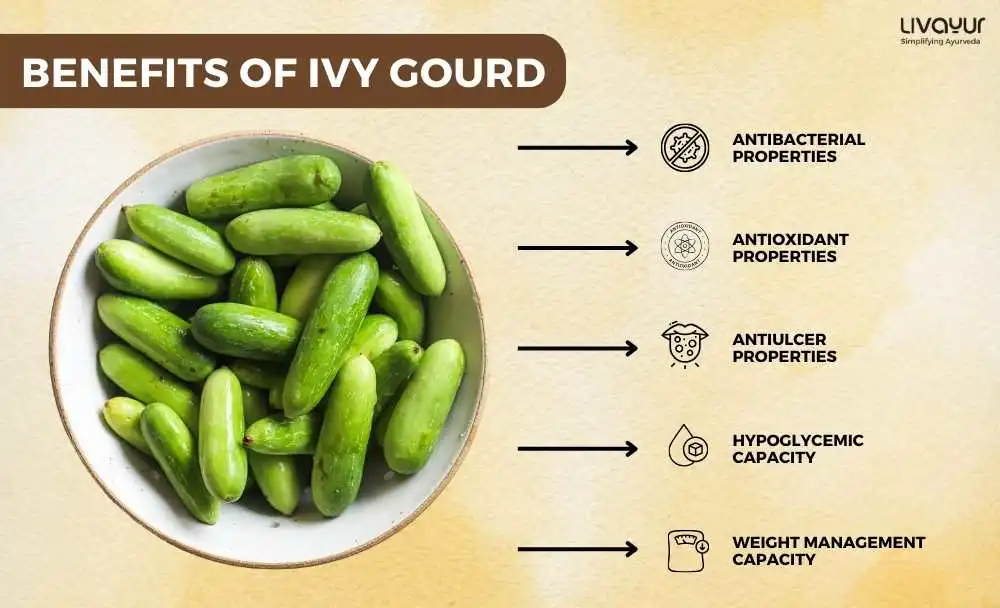
Ivy Gourd or Coccinia grandis is a perennial herbaceous vine of the family Cucurbitaceae.[1] In India, it is commonly known as kundru, kundri, tindora, and tindori in the native language.[2]
Kundru vegetable is one of the most beneficial medicinal herbs in traditional and Ayurvedic medicine. Its medicinal value may be attributed to the presence of secondary metabolites like alkaloids, flavonoids, saponins, glycosides, etc.[3]
In this blog, we will explore the kovakkai benefits also known as the ivy gourd, nutrition facts, side effects, and more.
Ivy Gourd Nutrition Profile
Ivy Gourd is a rich source of various vitamins and minerals. The Ivy Gourd nutrition content is listed below (per 100 grams).[3]
| Nutrient | Content per 100 g |
| Carbohydrates | 12.62% |
| Proteins | 15% |
| Water Soluble Proteins | 11.25% |
| Fats | 4.0% |
| Vitamin C | 25.55mg |
| Total Phenols | 61.92mg |
| β-carotene | 70.05mg |
| Potassium | 3.3mg |
| Phosphorous | 1.15mg |
| Sodium | 0.95mg |
| Calcium | 3.79mg |
Benefits of Ivy Gourd
There are many kundru benefits stemming from its various properties and capabilities to manage weight and treat diseases like Type 2 Diabetes. Without anu further ado let us explore the various kovakkai benefits.
1. Antibacterial properties
Studies have proven that the aqueous extract of Ivy Gourd leaves shows antibacterial activity against bacteria such as Escherichia coli, Salmonella choleraesuis, Shigella flexneri NICED, Shigella dysenteries, Bacillus subtilis and Shigella flexneri. Additionally, the plant exhibits larvicidal action. Furthermore, the antipyretic properties and inhibitory activity of ivy gourd against a range of bacteria and fungi have been assessed. [3]
2. Antioxidant properties
Studies have reported that the ethanol extract of the root of Ivy Gourd possesses antioxidant properties due to the presence of flavonoids.[3] Similarly, methanol extracts of Ivy Gourd that have glycosides and flavonoids possess potent antioxidant activity. Scientific investigations highlight Ivy gourd’s diverse activities, including hepatoprotective, antioxidant, anti-inflammatory, antinociceptive, antidiabetic, hypolipidemic, antibacterial, and antitussive properties. [3]
3. Antiulcer properties
The benefits of kundru also include its anti-ulcer properties. An experimental study on rats for the evaluation of the anti-ulcer activity of Ivy Gourd leaves was done.[3] With ulcer index being the parameter, the Ivy Gourd leaf extract showed a significant inhibition in ethanol-induced gastric lesions.[3]
4. Hypoglycemic capacity
Traditionally, Ivy Gourd benefits include being used for the treatment of type 2 Diabetes mellitus.[2] The hypoglycemic activity of Ivy Gourd is due to the presence of alkaloids, flavonoids, triterpenes, and β-carotene.[3]
Consumption of the Ivy Gourd herb reduces the ill effects of diabetes with fewer side effects and at a low cost.[2]
5. Weight management capacity

Studies have shown that Ivy Gourd root extract consisting of adipogenic activity significantly reduced intracellular fat accumulation during the early stages of adipocyte differentiation.[4] This established that Ivy Gourd may help prevent obesity mainly on the ability of its active constituents to suppress adipocyte differentiation. Ivy gourd is a great option for anyone trying to lose weight due to its low calories and high nutritional fiber. [4]
6. Potential uses of ivy gourd in cancer
The antioxidant and high beta-carotene content of ivy gourds aids in the prevention of cancer. These nutrients are known to limit the growth of tumor cells, which helps to prevent the spread of cancer cells. To lower the risk of developing cancer, consider including the ivy gourd in your diet. [3]
7. Potential uses of ivy gourd for the nervous system
Water-soluble vitamins, such as B2, are present in ivy gourd. This vitamin is crucial for maintaining your energy levels. Minerals, nutrients, and antioxidants found in kundru may help to strengthen the nervous system.
Uses of Ivy Gourd
Scarlet gourd, or Coccinia grandis, is another name for the ivy gourd, a multipurpose plant with a range of culinary and medicinal uses. Here are a few typical applications:
Traditional Medicine:
Due to the ivy gourd’s possible therapeutic qualities, traditional medical systems like Ayurveda have employed it. Ivy gourd health benefits are as follows:
- Blood Sugar Control: Ivy gourd extracts may have characteristics that assist in controlling blood sugar levels, which may help manage diabetes, according to certain research.
- Antioxidant Properties: Its antioxidant content may aid in the body’s defense against oxidative stress.
- Anti-inflammatory: Studies suggest it has anti-inflammatory qualities that may help with several medical issues.
It’s important to speak with a medical professional before using ivy gourd as a medicine because its effects can vary, and it may interfere with medicines.
Here’s how to consume ivy gourd
Ivy gourd is a common vegetable in Indian, African, and Southeast Asian cuisines. It can be cooked in curries, sautéed, or stir-fried. Different ivy gourd uses can be as follows:
- Pickles: To make a tart relish, ivy gourd is pickled in some areas with vinegar, oil, and spices.
- Stews and Soups: Because of its mildly tangy flavor, it’s used in stews, mixed vegetable dishes, and soups.
- Stuffed Ivy Gourd: Ivy gourds are excellent for stuffing with a variety of contents, such as spicy meats or other vegetables, due to their hollow structure.
- Salads: For a crisp texture, raw young ivy gourd can be added to salads.
Kundru Vegetable Side Effects
While Ivy Gourd is used in traditional and modern medicine for the treatment of diabetes, pain, hypertension, fever, jaundice, etc., it does show certain side effects. The following are some of the ivy gourd side effects:[5]
- Reduced potassium levels
- Increase in bleeding
- Allergic reactions
- Dizziness
- Gastrointestinal tract problems
- Uterine contractions
Precautions & Warnings for Ivy Gourd
Allergies: Ivy gourd side effects can include allergic reactions in those who are allergic to plants in the Cucurbitaceae family, which includes melons, squash, and cucumbers. To be safe, start with a modest dosage and see if there are any negative responses.
Pregnancy and breastfeeding: Not much is known about the safety of ivy gourds in relation to pregnancy and lactation. During these occasions, it is best to speak with a healthcare provider before taking substantial amounts of it.
Digestive Issue: Ivy Gourd can have many terpenoids and terpene-rich volatile oils that are irritating to the kidneys and gastrointestinal tract. However, the total yield of volatile oil is significantly lower in ground ivy (0.03%–0.06%) than in pennyroyal (1%–2%).
People who already have renal illness should avoid taking excessive doses as they may irritate their gastrointestinal mucosa.
Blood sugar levels: One of the many kovakkai benefits is its ability to control blood sugar levels. However, it may interact with medication and impact blood sugar levels.
So, if you have diabetes or take medication to control your blood sugar, be sure to closely monitor your levels.
Interactions With Other Food Or Drugs
Blood-Sugar Lowering Medications:
- Kunduru vegetable is frequently linked to hypoglycemic (blood sugar-lowering) effects.
- It may cause a sharp decrease in blood sugar levels when combined with treatments that help lower blood sugar, such as insulin or oral anti-diabetic medications. Hypoglycemia could arise from this, resulting in symptoms like lightheadedness, disorientation, and fainting.
- It is important to constantly monitor blood sugar levels and seek medical advice when using kunduru in conjunction with these drugs.
Anticoagulant Drugs:
- Although there is little data to support it, some herbal medicines, such as ivy gourd, may have anticoagulant effects.
- In combination with blood thinners such as aspirin or Warfarin, it may make bleeding more likely.
- When mixing these substances, careful observation and dosage adjustments for medications may be required.
Interaction with Other Herbs or Supplements:
There may be an additive impact and unforeseen repercussions if Ivy gourd is combined with other herbs or supplements that have similar effects (such as thinning blood or reducing blood sugar).
What’s More on Ivy Gourd?
Ivy Gourd’s benefits are not limited to those mentioned above. Every part of this plant is important in medicine as it is used in the treatment of various skin diseases, bronchitis, etc.[5] The Unani systems of medicine leverage the Ivy Gourd nutrition for Ivy Gourd benefits for the skin, such as ringworm, psoriasis, smallpox, and scabies, and other itchy skin eruptions and ulcers.[5] While there are many ivy gourd benefits for the skin, it is important to consult a healthcare professional before using it as medicine.

In many countries, people use various parts of the plant to get relief from asthma and cough.[5]
The oil of the Ivy Gourd plant is used as an injection into chronic sinuses.[5]
The entire plant product has been reported to be useful for the treatment of syphilis, sores, and bacterial infections, while the ash of the root is applied for skin complaints.[5]
FAQs
1. What is Ivy Gourd?
2. What are the attributes of Ivy Gourd’s medicinal properties?
The subsistence of secondary metabolites like alkaloids, flavonoids, saponins, glycosides, etc., in the plant may give to their medicinal value.[3]
3. What are the side effects of Ivy Gourd?
While Ivy Gourd is used in traditional and modern medicine for the treatment of diabetes, pain, hypertension, fever, jaundice, etc., it does show certain side effects like reduced potassium levels, increase in bleeding, allergic reactions, dizziness, gastrointestinal tract problems, uterine contractions, etc.
4. Is kundru safe to take in pregnancy?
The safety of ivy gourds during pregnancy and lactation is not well established. It’s advisable to consult a healthcare professional before consuming ivy gourd during pregnancy.
5. Is kundru good for diabetics?
In the realm of Ayurvedic medicine, kundru has long been used to treat diabetes. It has bioactive ingredients that support blood sugar management. Kundru is advantageous for those with diabetes and those who are at risk of developing the disease as it helps maintain stable blood glucose levels.
6. What is ivy gourd good for?
The kundru vegetable offers a multitude of benefits. Consumption of the leaves of ivy gourd helps in lowering blood sugar levels, aids in weight management, increases metabolism, improves digestion, prevents cancer and improves heart health.
7. Who should not eat ivy gourd?
Consuming ivy gourd can sometimes irritate the kidney and gastrointestinal tract. People who are allergic should avoid consuming kundru vegetable. Although ivy gourd side effects during pregnancy are still a topic of research, pregnant and breastfeeding mothers should consume ivy gourd only after consulting healthcare providers.
Conclusion
Kunduru is a nutritious vegetable that offers many health benefits, including regulating blood sugar, promoting weight loss, acting as an antioxidant, and much more. However, it can also cause side effects in some people, such as allergic reactions, GIT issues, etc. As with any dietary changes, it is important to consult with your healthcare provider before adding Ivy Gourd to your diet.
Disclaimer:
The information mentioned here is for educational purposes only and is not intended to be an alternative to medical treatment by a medical practitioner. Please consult a professional medical practitioner before any dietary modifications.


















